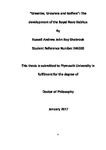Greenies, Growlers and Goffers: The development of the Royal Navy Habitus
| dc.contributor.supervisor | Gabriel, Norman | |
| dc.contributor.author | Shobrook, Russell Andrew John Roy | |
| dc.contributor.other | Faculty of Arts, Humanities and Business | en_US |
| dc.date.accessioned | 2017-08-08T13:44:05Z | |
| dc.date.issued | 2017 | |
| dc.identifier | 246550 | en_US |
| dc.identifier.uri | http://hdl.handle.net/10026.1/9700 | |
| dc.description.abstract |
This thesis applies the theoretical perspective of Bourdieu to investigate the development of a Royal Navy habitus. It is one of the first studies to uncover distinct social processes within the Royal Navy that otherwise would have largely remained unknown to a wider academic audience. An ethnographic methodology was used to investigate the attitudes of serving members of the Royal Navy using an approach that was informed by the Biographical Narrative Interview Method (Wengraf 2001). In my analysis, I constructed a complex picture of how individuals develop a particular habitus, showing how the interplay between the institutional and individual habitus influences the process and pattern of their choice making. Through the development of the institutional habitus and its internalisation by each person, the previously unthinkable becomes possible, the possible becomes routine and not doing the routine, unthinkable. This sets the pattern for subsequent behaviours which are passed on to the next generation. Although each reproduction is subtly different it falls within the broader outline of the institutional habitus as constituted at that time. The Royal Navy creates aspiration through division by developing competition between the different ranks of its personnel within the organisation. Strong familial relationships, kinship bonds and the development of an affective dimension through traineeship produce the Royal Navy habitus that becomes the structuring principle for agents’ future career development. Through the imposition of an institutionally defined cultural capital, agents engage in this process in order to realise their career ambitions. | en_US |
| dc.language.iso | en | |
| dc.publisher | University of Plymouth | |
| dc.subject | Royal Navy | en_US |
| dc.subject | Habitus | |
| dc.subject | Cultural Capital | |
| dc.subject | Narrative | |
| dc.subject | Traineeship | |
| dc.subject.classification | PhD | en_US |
| dc.title | Greenies, Growlers and Goffers: The development of the Royal Navy Habitus | en_US |
| dc.type | Thesis | |
| plymouth.version | publishable | en_US |
| dc.identifier.doi | http://dx.doi.org/10.24382/819 | |
| dc.rights.embargodate | 2018-08-08T13:44:05Z | |
| dc.rights.embargoperiod | 12 months | en_US |
| dc.type.qualification | Doctorate | en_US |
| rioxxterms.version | NA |
Files in this item
This item appears in the following Collection(s)
-
01 Research Theses Main Collection
Research Theses Main


